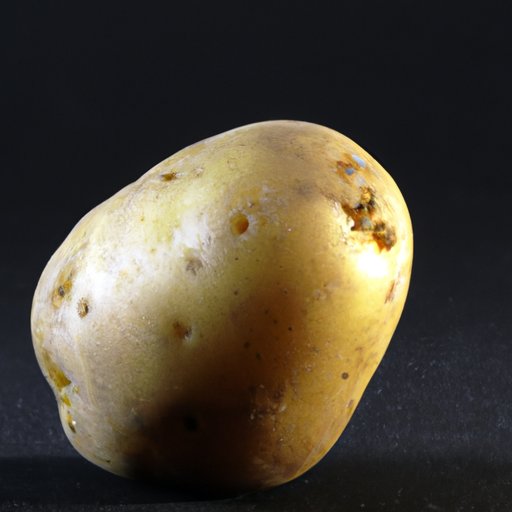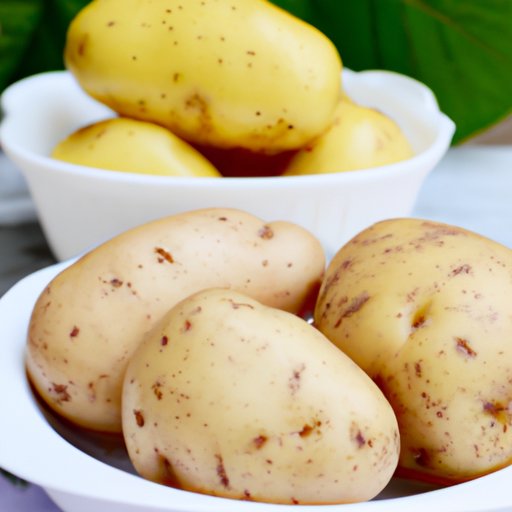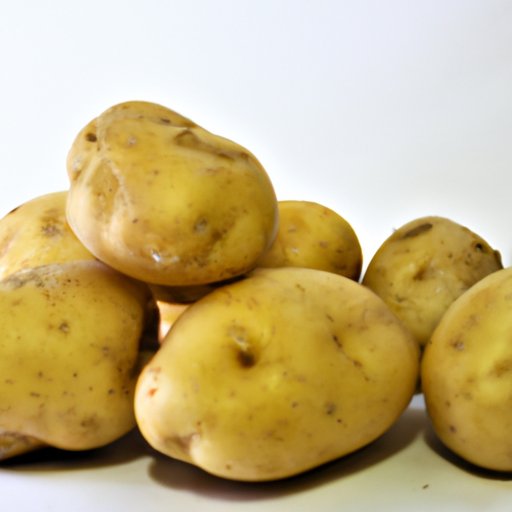Introduction
Potatoes are one of the most popular vegetables in the world. They can be boiled, baked, fried, mashed, and served in a variety of dishes. But are potatoes healthy? This article will explore the nutritional benefits of potatoes and how to make them healthier. We’ll examine their role in a balanced diet and the various health advantages of different types of potatoes. We’ll also look at the pros and cons of different potato preparation methods and uncover the surprising health benefits of this popular food.

Investigating the Nutritional Benefits of Potatoes
Potatoes are high in carbohydrates, fiber, vitamins, minerals, and protein. They are low in fat and calories. A medium-sized (5.3 ounces) potato contains about 110 calories, 26 grams of carbohydrates, 3 grams of fiber, 2 grams of protein, and 0 grams of fat. It is also a good source of vitamins C and B6, as well as potassium, magnesium, and iron.
The health benefits of eating potatoes include improved blood sugar control, weight loss, and lower cholesterol levels. Potatoes are also rich in antioxidants, which help protect against free radical damage and inflammation. Additionally, potatoes contain resistant starch, which is an indigestible carbohydrate that helps promote digestive health.
In order to get the most out of potatoes, it’s important to incorporate them into a balanced diet. This means limiting portion sizes and avoiding adding too much salt or fat. Eating potatoes with other nutrient-rich foods like vegetables, legumes, and lean proteins can help create a healthy meal.
Exploring the Health Advantages of Eating Potatoes
Different types of potatoes offer different health benefits. Sweet potatoes, for example, are higher in vitamin A and beta carotene than regular potatoes. Red-skinned potatoes are higher in antioxidants and may help reduce inflammation. Purple potatoes are higher in anthocyanins, which are powerful antioxidants that can help protect against disease.
There are also several ways to make potatoes healthier. One way is to leave the skin on when cooking. The skin is rich in fiber, vitamins, and minerals. Another way is to avoid frying potatoes. Frying increases the calorie and fat content of potatoes, making them less healthy. Baking, boiling, and mashing are healthier alternatives.
Examining the Role of Potatoes in a Balanced Diet
Potatoes are a great source of carbohydrates and fiber. They are also a good source of vitamins and minerals, including Vitamin C and B6, potassium, magnesium, and iron. Additionally, potatoes are a good source of protein. A medium-sized potato contains about 2 grams of protein, which is equivalent to the amount of protein found in an egg.

The Pros and Cons of Different Potato Preparation Methods
Boiling potatoes is the healthiest way to prepare them. Boiled potatoes retain more of their nutrients than any other method of cooking. Baking potatoes is also healthy as long as you don’t add too much fat or salt. Frying potatoes is the least healthy option, as it adds fat and calories. Mashing potatoes is a healthier alternative to frying, but again, it’s important to limit added fats and salts.

Uncovering the Surprising Health Benefits of Potatoes
Potatoes are a surprisingly healthy food. They are packed with antioxidants, which can help protect against free radical damage and inflammation. They are also high in fiber, which can help promote digestive health. Additionally, potatoes can help keep your heart healthy by lowering cholesterol levels and improving blood sugar control.
Conclusion
Potatoes are an incredibly versatile and nutritious vegetable. They are a great source of carbohydrates, fiber, vitamins, minerals, and protein. Different types of potatoes offer different health benefits, and there are ways to make potatoes healthier, such as baking or boiling instead of frying. Additionally, potatoes are packed with antioxidants, which can help protect against disease and inflammation. Finally, potatoes can help keep your heart healthy by lowering cholesterol levels and improving blood sugar control. All of these factors combined make potatoes a healthy and nutritious addition to a balanced diet.
(Note: Is this article not meeting your expectations? Do you have knowledge or insights to share? Unlock new opportunities and expand your reach by joining our authors team. Click Registration to join us and share your expertise with our readers.)
